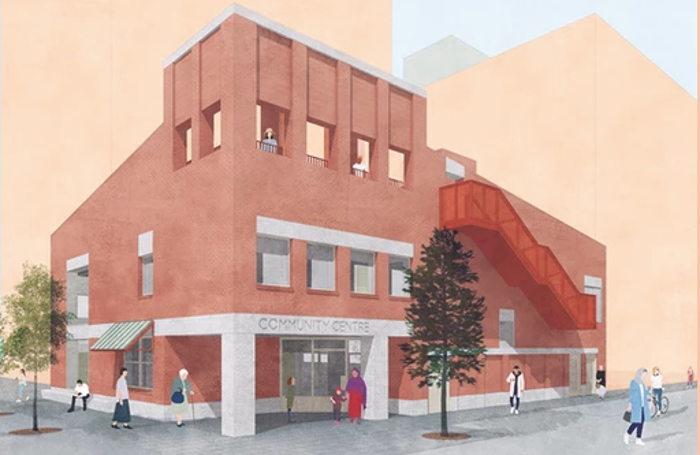Addressing the "under-representation of women and minority groups" in design teams is one of the declared aims of a new framework – the Architecture and Urbanism (A+U) framework – which was announced last week by the Mayor of London. The framework is seeking to boost diversity in the design process by making it part of the procurement conditions.
Peter George welcomes this news. He is Programme Director of the huge Meridian Water regeneration programme at London Borough of Enfield and he regards procurement as a very effective lever for improving diversity.
Meridian Water is a £6bn, 25 year London regeneration programme led by Enfield Council, bringing 10,000 homes to Enfield, north London. Practices who wanted to work on Meridian Water Stage 4 project had to commit to team up with a (minimum) 50 per cent Black or minority ethnic-led practice; a 50 per cent women-led practice; and a practice local to Edmonton.
“Community groups around Meridian Water pay attention to what we are doing,” George states. “They will rightly question us if we are not employing local people, or raise attention if there are not people of colour among the construction team. It is simply not right if our professional team does not reflect Edmonton’s rich diversity.”
One of the practices that worked on Meridian Water Stage 1 was Edmonton-based micropractice Fisher Cheng. They worked on a four storey affordable housing complex, as one of two winners (the other being Urban Projects Bureau) from several small practices invited to bid.
While they are unsure what the precise selection criteria were, they are certain that the fact that they live and work locally to the site and are passionately involved in their area had a great deal to do with it.
“We presented a small portfolio for the design competition,” reveals Richard Fisher, one of the practice’s two directors, “showing ideas for what the affordable block could be, showing how we would approach deck access among other aspects. It gave us the opportunity to demonstrate the skillsets we had developed in larger practices.”
“In terms of winning work, if you are a practice that is part of the community and they are recommending you - advocating for you - then you are in a much stronger position,” points out Peter George. He will be discussing ways in which architects can transition into different sectors, via collaboration and procurement opportunities, on Wednesday 10 November at the RIBA’s online conference Guerrilla Tactics: Stop Collaborate and Listen.
This was the first non-domestic residential project that Fisher Cheng had undertaken, although founders Yuting Cheng and Richard Fisher both had a wealth of project experience from previous roles at Rogers Stirk Harbour + Partners and Hawkins\Brown respectively.
In working on Meridian Water, Fisher Cheng collaborated with HTA Design, and this partnership proved valuable for both parties. HTA invited Fisher Cheng to work with them again in bidding for Gascoigne East, in Barking, for BeFirst. BeFirst had stated in its procurement that an emerging practice had to be part of the team.
“HTA were genuinely receptive to our design ideas for the competition,” enthuses Yuting Cheng. “We were part of the interview, and our images were included in the competition boards.”
As part of Gascoigne East’s Phase 2, Fisher Cheng designed a community centre and have submitted planning for it.

“Working within a large practice, you might not get the same experience or exposure – being part of an interview or presentation for a large bid,” points out Cheng. “But we felt integral to the whole process during Gascoigne East.”
“A genuine collaboration enriches the whole scheme. It is also good value for the client: a smaller practice will dedicate care and attention to the part they are engaged in that might otherwise be overlooked by a large practice as just one corner of a huge masterplan.”
Procurement grounded in improving diversity, which might insist on the involvement of emerging practices, is something that provides tangible results, Peter George believes.
“For Meridian Water Stage 1, the project and the architectural language has already benefited from increased inclusivity,” states George. “It is important that the architecture itself is inclusive and welcoming.”
“There are nuances and subtleties to that. People from different particular backgrounds may not feel they are being taken into account in standard housing offerings.”
George is hopeful that the diversity objectives instigated in Meridian Water’s procurement, mirrored by the recently announced A+U framework, will become increasingly common.
“The government is looking at public procurement rules now that OJEU no longer applies. There will probably be a greater emphasis on appointing locally.”
He also foresees increasing public sector needs and advises practices to concentrate on establishing strong relationships with local authorities. Being able to demonstrate an understanding of and commitment to the borough you are in – or work in – will be an advantage.
For Fisher Cheng, the experience of being the junior partner in collaborations springing up from these procurement requirements has been game-changing.
“It has certainly given us extra confidence,” points out Richard Fisher. “When we read about a new, big competition in the press, it is now something we can potentially go for. We might approach a large practice and ask if they would consider having us on their team.”
Thanks to Peter George, Programme Director Meridian Water, Enfield Council; and Yuting Cheng and Richard Fisher, Directors, Fisher Cheng.
Peter George will be speaking about opportunities for practices to transition between sectors on Wednesday 10 November at the RIBA’s online conference Guerrilla Tactics: Stop Collaborate and Listen.
Text by Matt Milton. This is a Professional Feature edited by the RIBA Practice team. Send us your feedback and ideas.
RIBA Core Curriculum topic: Business, clients and services.
As part of the flexible RIBA CPD programme, professional features count as microlearning. See further information on the updated RIBA CPD core curriculum and on fulfilling your CPD requirements as a RIBA Chartered Member.









